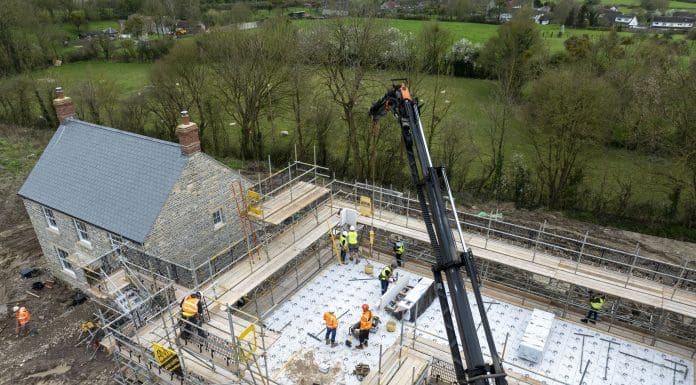Why do so many MMC ventures fail? Jenny Smith-Andrews, head of marketing at H+H UK, suggests that it’s time for a rethink when it comes to funding innovation in housebuilding
The concept of houses built in factories has always sounded a bit utopian to those of us involved in the delivery of multiple units, so it has been something of a puzzle to see the Westminster government directing so much funding towards volumetric enterprises in the name of modernising the housebuilding sector.
There is nothing new in the concept of modular building. As long ago as 1926, architectural pioneer Walter Gropius considered a future where lower-cost housing would be made possible “by mass production methods of stock dwellings which are no longer constructed at the site but are produced in special factories”.
It can be a seductive vision: muddy, weather-dependent sites replaced by clinical factories able to mass-produce homes with tight quality control and efficient use of labour.
It’s seductive, but just doesn’t seem to work in the UK. There are numerous reasons, but the most immediate surely relate to the business model that underpins the housebuilding industry.
MMC in volatile markets
Factory-built housing needs factories, which in themselves require massive investment both in the facility itself and the full-time permanent workforce to assemble the structures.
Once operational, such facilities need a constant and predictable market – the production lines cannot be turned on and off, or even slowed, to flex with the market.
This is a market that is hugely dependent on consumer confidence and, as we routinely see, that’s fickle. A rise in interest rates, a cost-of-living increase or any kind of economic uncertainty can result in an extremely fast slowdown in demand.
Housebuilders have to be able to react fast to this degree of volatility – stockpiling completed house units is simply not an option.
In its recent review of the modular housing sector, Modern Methods of Construction – What’s Gone Wrong?, the Built Environment Select Committee looked for answers from, among others, Homes England, which was keen to defend its significant investment in modular factory companies.
The conclusion of this scrutiny was summarised in January this year by chair Lord Moylan: “The government need to change tack. Simply throwing money at the sector hasn’t worked.”
A different MMC focus
This doesn’t mean giving up on Modern Methods of Construction. What it should mean is a change of focus. Too much of the headline news (and financial support) has been directed towards the volumetric modular concept and perhaps this is a problem with the presentation of MMC.
Modern does not necessarily equate to pre-assembled and Method does not necessarily mean factory-based house units. The accepted definition of MMC (following on from the 2016 Farmer Report) is based around seven categories and only one category requires the use of factory-built entities.
As Lord Moylan suggests, government funding, whose objective is to deliver a greater volume of high-quality homes, needs better targeting, informed by a much deeper understanding of the structure of the UK housebuilding sector.
Surely the government’s role should be to stimulate the market and invest in new social housing and be less enthusiastic in trying to dictate how new homes should be delivered.
H+H has always supported innovative approaches to house construction – our own Vertical Wall Panels and i-House System (both Category Two MMC) represent a strong commitment to new concepts and radical ideas.
The difference is that these initiatives are evolutionary, rather than revolutionary. Just as importantly, they provide scalable offsite solutions that work as well for the regional housebuilder delivering five units as for the volume sites involving several hundred units.
Karm Homes is one such housebuilder, keen to explore new ways to deliver high quality and affordable homes.
The company’s most recent project involves two chalet bungalows in Dorset and director Martin Keenes was looking for an MMC solution that would provide speed, simplicity and excellent thermal performance.
“We have looked at other MMC systems such as SIPs but found them to be more expensive than the i-House masonry solution plus the increased fire risk and insurance premiums associated with a timber build.”
Reassuringly familiar
Just as importantly, Martin feels that his customers are looking for the reassurance of a masonry structure. In this instance, the Vertical Wall Panels are combined with prefabricated timber floors and roofs: a package that is provided as the i-House solution, enabling the entire watertight structure of the house to be completed on site within just one week.
The Built Environment Select Committee noted in its inquiry that considerable success had been achieved with Category Two MMC solutions – recognising that offsite prefabrication can provide improved speed and quality of delivery.
The development of such systems, I would argue, is down to the technical innovation of the manufacturers, who understand the needs of their market. They have evolved without the type of government support that seems to be led by dogma rather than a pragmatic understanding of the market.
Housebuilding may have a tendency towards conservatism – but being risk-averse is not a negative in a sector where the product in question represents a huge lifetime investment for the buyer. Innovation needs to be driven by experience and to keep the customer’s objectives as the first consideration.
In this context, we see innovative MMC solutions as being driven by evolutionary, incremental change. Unless a future government is able to provide a steady and predictable demand for factory-built homes, it seems increasingly unlikely that such enterprises will prove financially viable.
Jenny Smith-Andrews
Head of marketing
H+H UK
Tel: +44 (0)1732 886333
Email: infouk@hplush.com
The post What’s the future for MMC? appeared first on Planning, Building & Construction Today.


